The Intel SSD 760p 512GB Review: Mainstream NVMe Done Right
by Billy Tallis on January 23, 2018 11:30 AM ESTAnandTech Storage Bench - Light
Our Light storage test has relatively more sequential accesses and lower queue depths than The Destroyer or the Heavy test, and it's by far the shortest test overall. It's based largely on applications that aren't highly dependent on storage performance, so this is a test more of application launch times and file load times. This test can be seen as the sum of all the little delays in daily usage, but with the idle times trimmed to 25ms it takes less than half an hour to run. Details of the Light test can be found here. As with the ATSB Heavy test, this test is run with the drive both freshly erased and empty, and after filling the drive with sequential writes.
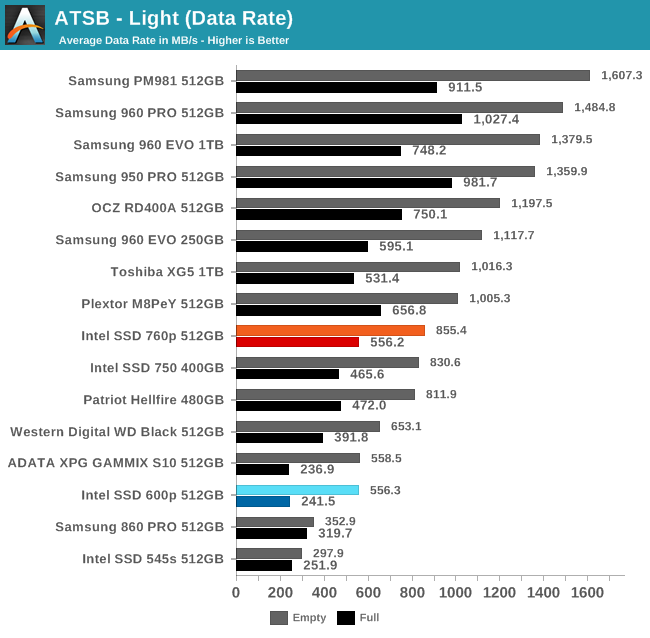
The Light test reveals bigger performance differences for full and empty drive states than the Heavy test, but the 760p doesn't suffer as much as most drives. The average data rates from the 760p are slightly higher than from the Intel SSD 750, and much higher than the 600p or the SATA drives. On the other hand, the TLC-based Samsung PM981 is almost twice as fast.
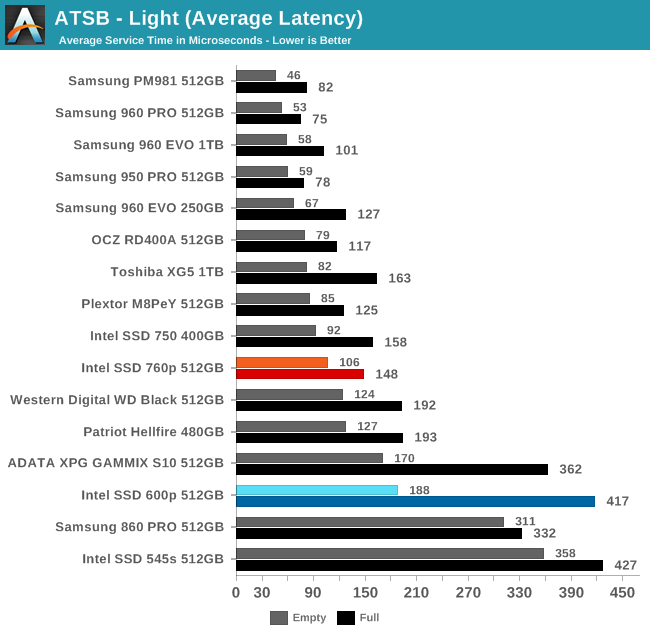
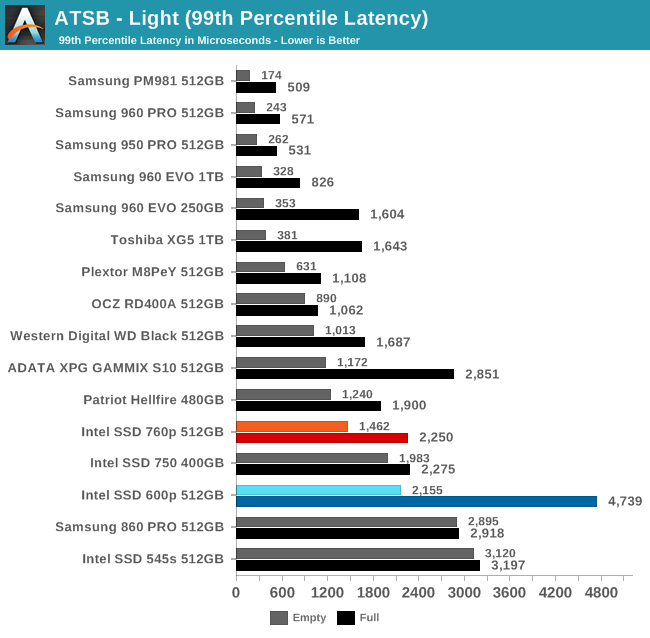
The average latency scores of the Intel SSD 760p are twice those of the fastest NVMe SSDs, but this isn't enough to amount to a noticeable difference on a light workload. The 99th percentile latencies are much higher than those of Samsung's NVMe drives, but are still faster than SATA SSDs.
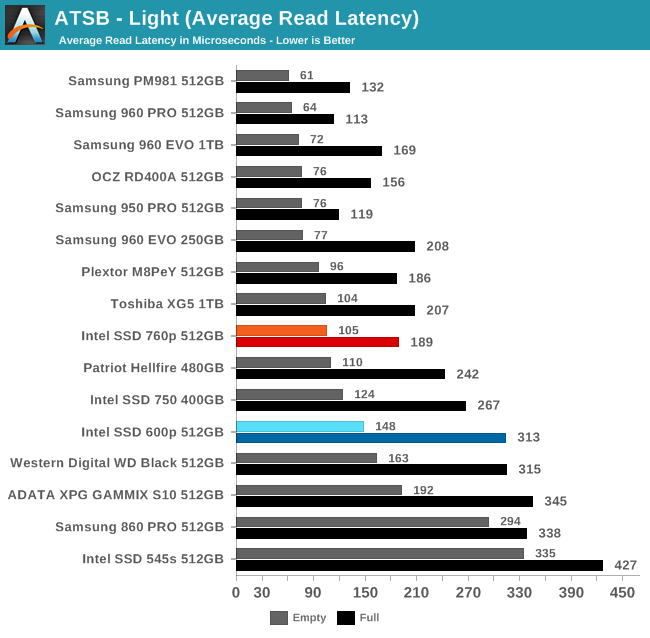
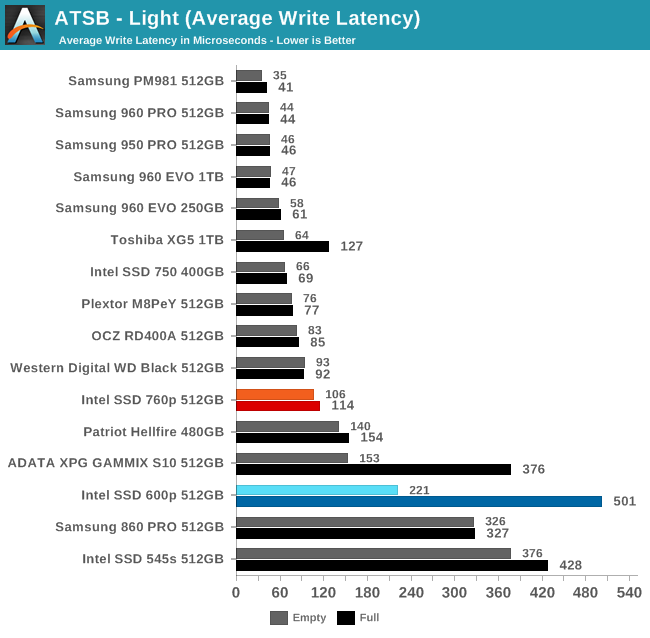
The average read latencies from the Intel 760p fall into the middle of the range for NVMe SSDs, but the average write latencies are clearly on the high side of normal.
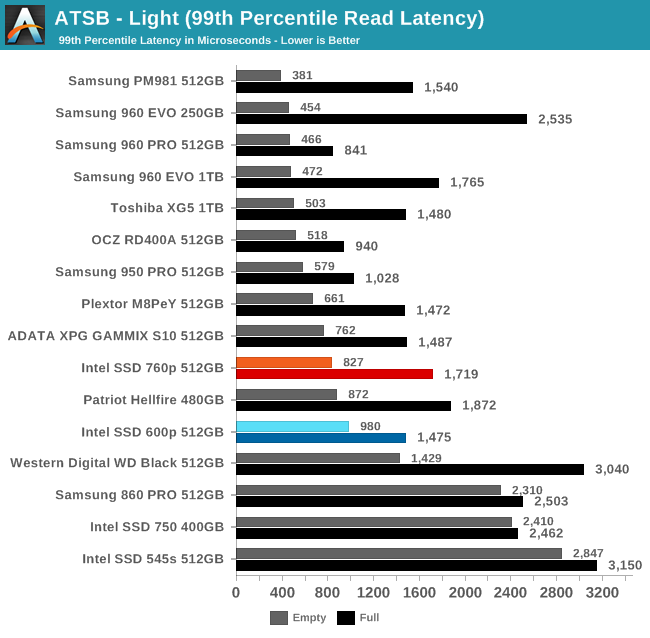
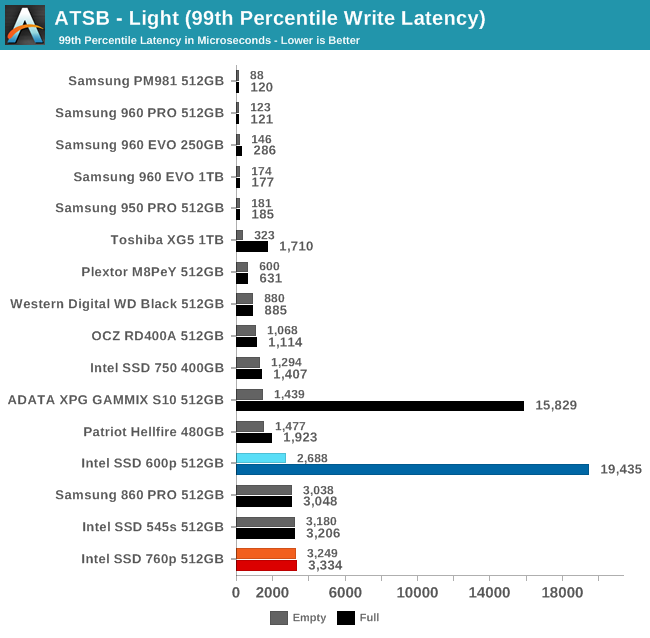
The 99th percentile read latencies of the 760p on the Light test are acceptable for a low-end NVMe SSD, but the full-drive score is actually slightly worse than the Intel 600p. On the write side, the 99th percentile latency is actually very slightly worse than good SATA SSDs, but the 760p doesn't get noticeably worse when full.
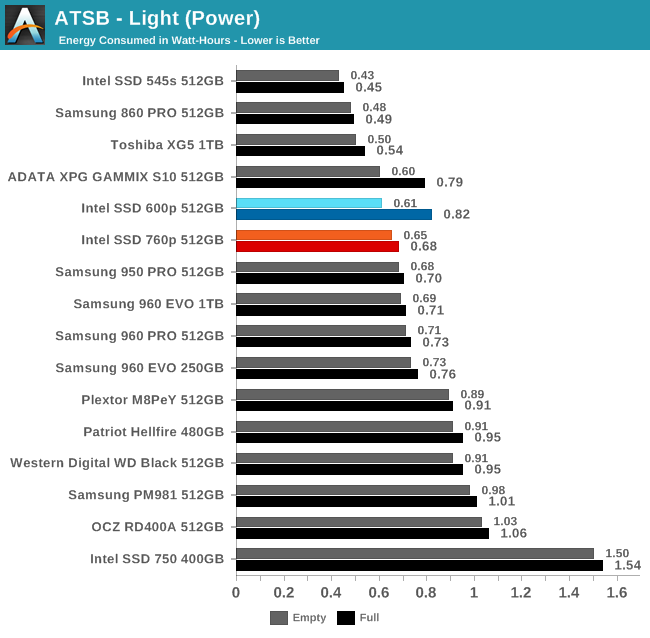
The two SM2260-based NVMe SSDs join the Toshiba XG5 this time as the most efficient NVMe SSDs ahead of the Intel 760p, but the SM2260-based 600p and GAMMIX S10 fall behind when the test is run on a full drive. The Samsung drives mostly use slightly more power than the 760p, but the PM981 ends up near the bottom of the chart.










51 Comments
View All Comments
Jhlot - Tuesday, January 23, 2018 - link
Right we are comparing EVO not PRO here. And this is Intel's midrange consumer NVME now if Optane is high/enthu and 600p is low, and the 760p still doesn't compare to Samsung's lessor NVME 960 evo consumer from more than a year ago. The 960evo has a small premium in price because it can command it based on performance since no one else is stepping up to its level. Also the OEM 960 evo (PM961) is often available new on ebay for a little over $300 at 1TB which maybe the Intel offering will match. So, an altogether underwhelming showing by Intel is a valid criticism while msabercr's exaggerated Beetle vs. 911 jab which is implicit on price/offering tier not being comparable is misplaced because they are comparable consumer NVME offerings.milli - Thursday, January 25, 2018 - link
Why even compare to the 960 EVO?It barely matches the Toshiba XG5 and there's already a faster XG5-P.
andychow - Tuesday, January 23, 2018 - link
Toshiba is trying to sell their memory chip business, that's why their prices are out of whack and they have no successor. They gutted that division and leave old stock at inflated prices to pretend their brand has some sort of value. Bain must be working some sort of angle to see $18B of value.emvonline - Tuesday, January 23, 2018 - link
it has 2 dram chips? for a 512GB SSD? with average performance? is that normal?svan1971 - Tuesday, January 23, 2018 - link
Intel 50% lower performance for 33% less money than Samsung.HStewart - Tuesday, January 23, 2018 - link
And the new 960 was release today.megapleb - Tuesday, January 23, 2018 - link
Real world testing would be very helpful on SSDs. While the benchmarks are great, as a consumer, what I really care about is how much difference a drive will make to dad to day activities - boot time, application loading etc.niva - Tuesday, January 23, 2018 - link
You won't see much difference in those use cases, maybe some heavy applications might take a second or two longer to load even in the slowest drives. These drives only differentiate themselves in situations where you hammer them with tons of data and instructions.bug77 - Tuesday, January 23, 2018 - link
And that's the "dirty" secret of SSDs: as much as benchmarks show them performing faster or slower, in real life it makes little difference unless your workflow relies on heavy I/O. I can confirm that as I have currently installed Vertex4, 850EVO and MX300 drives and I cannot tell of any difference when using any of them.I've said it before and I'll say it again: when buying an SSD, the only rule to follow is "get the biggest drive you can fit in your budget".
Amandtec - Wednesday, January 24, 2018 - link
Contrarian view: A PC is as much a status symbol as a tool. By your logic no one should buy a BMW because you unlikely to use all that extra speed.